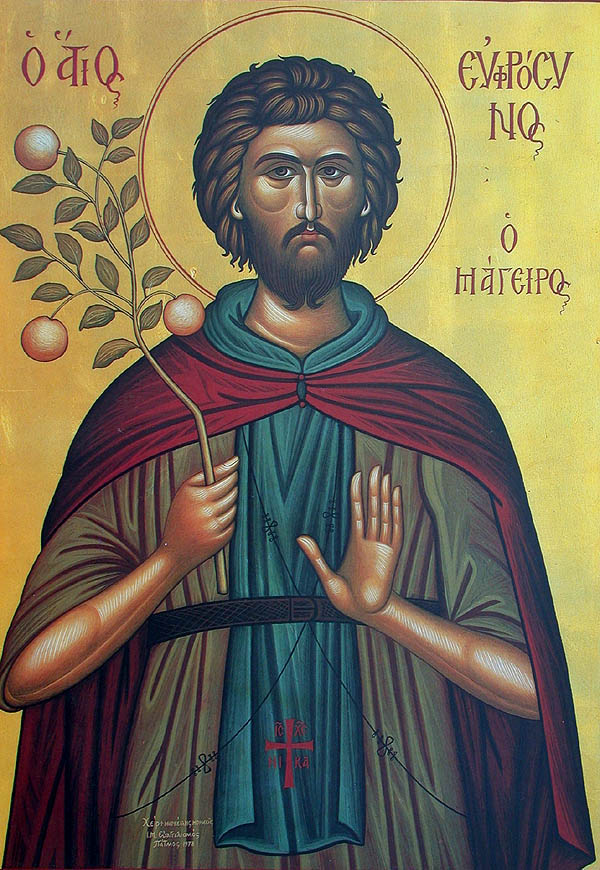
About a week ago I stumbled upon a fascinating bit of knowledge. It is no secret that the Greeks have saints for everything, with “name days” being in some cases more important than actual birthdays.
Note: Greeks are given names of saints when they are baptized. The day that the saint died is usually considered the date for the name day. For example, I am named after St. Demetrius (Άγιος Δημήτριος ), and my name day is October 26th. It does not always have to be the same name as your real name. However, if there is a match, that saint is more often than not used.
However, I found a new patron saint, and he is now one of my favorites. His name is, St. Euphrosynus (some spell it Euphrosynos) and he is the saint of [Greek] cooking! I added the Greek bit, he’s really just the saint of cooking in the orthodox faith, but this is a Greek food blog, soooo 🙂 By the way, the Catholics have a saint for this as well – St. Lawrence.
What really amazes me, is after I learned of St. Euphrosynus the Cook, I found a ton of information about him, not only online, but within the pages of our many Greek cookbooks. It would appear that a Greek chef carry an icon of St. Euphrosynus with them at all times, and some even say a prayer before starting to cook and or serve the meal they have prepared. Needless to say, we’ll be getting one of his icons for good luck.
Therefore, today let’s learn about this saint that Greek chefs pledge their allegiance to while in the kitchen.
Background of St. Euphrosynus the Cook of Alexandria
While there isn’t a lot of information available about this saint’s early life, we do know he was born to simple parents. He grew up to be a humble monastic (μοναχός, a person who withdraws from the world in order to dedicate himself to the written word and seek union with Jesus.)
He was a monk and the head cook at a monastery in Palestine. He was obedient, dedicated, and refused to absent himself from the thought of God at all times. He continuously set time after his duties to prayer and fast.
He was noted as having patience that made the other monks amazed. They would reproach him, but he never complained and endured every unpleasantry aspect in life with no negative thoughts or words.
His never wavering devotion to God and the Gospel was not well known to his fellow monks, so the Lord Himself revealed these facts to the brethren of St. Euphrosynus the Cook via a vision one of the priest monks experienced.
The Vision
One day a priest from the monastery prayed to the Lord and asked Him to show him the what blessings the righteous people will see in the ages to come. What happen next would change the way the world would come to view St. Euphrosynus the Cook
That night the priest had a vision that he was shown Paradise and was standing in the great garden. Paradise looked more beautiful that anything he had ever seen before, that he was filled with both joy and fear. As he looked around, he saw a fellow monk there, the cook, Euphrosynus. Surprised that his fellow monk was not only in this vision but standing with him in Paradise, he asked Euphrosynus how he came to be in the garden. The cook looked at the priest and told him that is was the mercy of God that he were there.
The priest then asked Euphrosynus if he would be able to take something from the garden with him to capture the beauty that he was witnessing. Euphrosynus told the priest to take whatever he wished. The priest looked around and noticed these beautiful red apples growing in the garden of Paradise. He pointed at them, and Euphrosynus walked over and plucked three of the apples and wrapped them in a cloth and handed them to the priest.
The next morning when the priest awoke, he thought the vision was just a dream. He was not sure what he had experienced. Then, as he looked around his room, he noticed a cloth covering something on the table next to him. He unwrapped it, and there they were, the three apples from Paradise. They were emitting a fragrance that was the most wonderful thing he had ever smelled.
He got dressed and went to find the cook Euphrosynus. Upon locating him, the priest monk pulled him aside and made him speak under oath as to where he was the night before. Euphrosynus looked at the priest, and told him that he was where the priest was. The priest told Euphrosynus that God had fulfilled a prayer he had made earlier by showing him Paradise and bestowing upon him the fruit through “the lowly and unworthy servant of God, Euphrosynus.”
The priest then went and called all his fellow brethren to an assembly. When everyone arrived he informed all of everything he had experienced. He told them of Euphrosynus the cooks devotion and faith in God. He also spoke of the apples and their wonderful fragrance.
The monks sat in awe listing as they discovered they had a servant of God in their monastery. At once, they fled to the kitchen to seek out Euphrosynus. However, he was not there. They looked all over the monastery for him – but he was gone, believed to have fled to the desert to remain in isolation and fully devote himself to God.
He was never seen again and his whereabouts never discovered.
His fellow brethren always remembered that Euphrosynus the cook had been to Paradise and that one day they too would meet him there. The pieces of the apple were distributed to all the brethren when healing or blessings were required.
Euphrosynus was made a saint because of his devotion and obedience to God and him being seen in Paradise.
Feast Day Of St. Euphrosynus the Cook And His Troparion
St. Euphrosynus feast day is September 11th. It is celebrated by the orthodox faith. A feast day is an annual celebration of a saint in the orthodox church. It is a mix of specific religious elements, church scriptures, prayers, etc., and food and spending time with loved ones while honoring a specific saint. These days normally correspond to the date the saint died.
On this day, the Troparion for St. Euphrosynus the Cook is said:
You lived in great humility, in labors of asceticism and in purity of soul, O righteous Euphrosynus. By a mystical vision you demonstrated the Heavenly joy which you had found. Therefore make us worthy to be partakers of your intercessions.
Troparion — Tone 4 – A troparion (τροπάριον) is orthodox religious music from the Byzantine era.
Conclusion & Personal Thoughts
First and foremost, thank you for taking the time to read this longer post. We tried to make it an easy read. Both Jane and I learned a lot while doing research for this article. We both took away something from St. Euphrosynus the cook, as one is supposed to when learning about saints I suppose.
St. Euphrosynus was a cook, and that is simply a title that has stuck because that is what his job was. We do not have any recipes nor descriptions of meals he had made that transcended everything else ever prepared in a kitchen. He is remembered because his devotion to God was unmatched. He never complained. He never failed to perform his duties. He never missed his prayers or times of fasting. He isolated himself to build a relationship with Jesus – all while being a simple cook.
It is inspiring, whether you are religious or not, to have that kind of devotion to something you believe in. It is something we can all hope to attain. It really made me think as I am writing this that having a blinding devotion to something is truly inspirational. To not let things get to you, to keep your eyes on your beliefs and not on what anyone thinks.
Thank you St. Euphrosynus for reminding us that dedication can lead to great things.
- Kenton & Jane
Notes: special thanks to OCA and orthodoxwiki as they were the main sources for this article.


